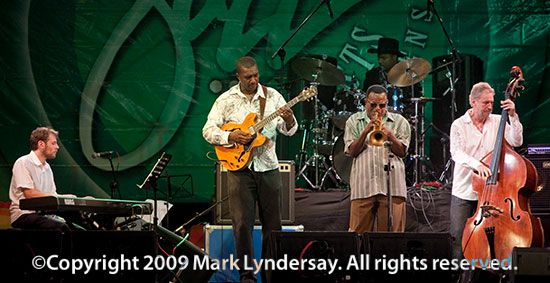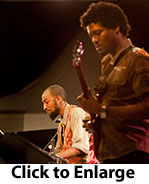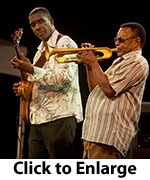Jazz on the Greens, 2009
02/04/09 21:52 Filed in: Reviews
Harder jazz challenges JAOTG audience
Review and photographs by Mark Lyndersay. Published in the Trinidad Guardian on April 02, 2009.

The Jazz Artists on the Greens (JAOTG) Quintet, featuring Errol Ince on trumpet, Theron Shaw on guitar, Klaus Mueller on keyboards, Nilson Matta on bass and Sean Thomas on drums perform at Jazz artists on the Greens at the UWI Centre for the Creative Arts
As I wander onto the lawn at UWI's Centre for the Creative Arts, I am struck by the simultaneous wonders of the cool blue of evening as it drifts into night and the sharp sparkle of Ming Low Chew Tung's electric piano and Theron Shaw's guitar as they crackle across the field.
I'm late, missing Caroline Mair, who I've been hoping to hear for some time now, and irritated. It's taking me a while to get my bearings.
 Vaugnette Bigford is on, doing a breathy, soulful take on 'Tradewinds' that goes down well with the crowd, who are primed for tasteful, well-rendered standards and respond to them enthusiastically throughout the evening.
Vaugnette Bigford is on, doing a breathy, soulful take on 'Tradewinds' that goes down well with the crowd, who are primed for tasteful, well-rendered standards and respond to them enthusiastically throughout the evening.
As Bigford launches into her final song, 'Until you come back to me,' I have an overwhelming sense of a singer holding back, singing cautiously while offering an accessible performance. The crowd salutes her for the set, but I can't help feeling a bit disappointed, there's bigger ford than that in those lungs and they've been more rousing than this.
 Next up is Blue Culture, a young ensemble that plays well and with a mature authority.
Next up is Blue Culture, a young ensemble that plays well and with a mature authority.
More than half their set is made up of their own compositions, including three by bandleader and drummer Karl Doyle.
The potential of their writing and playing is impressive, solid, clean playing and a great sense of interplay on the stage, but the soloing remains turn based and hews to a straight line.
With the kind of talent they were showing onstage, they seemed ready to work more duets and triple exchanges within the larger group performance. If that sounds sexy, well it's because it is, when it's done well and Blue Culture seemed primed to take their playing to a looser, more improvisational level.
Some of that started to happen with their final number, 'My wake up call' by tenor pannist Derron Ellies and Doyle as the band began to play with more abandon and confidence, the soloing less isolated and commensurately more engaging.
 Jazz is about establishing the line, working the line and then departing inventively from the line. Tamara Castañeda Rodriguez took the stage with two fellow Cubans, though the term seems out of place with an all-female band.
Jazz is about establishing the line, working the line and then departing inventively from the line. Tamara Castañeda Rodriguez took the stage with two fellow Cubans, though the term seems out of place with an all-female band.
Castañeda plays the vibraphone, and in the confines of a trio, the capabilities of her bassist and drummer were critical to fill out the tendency of a small vibraphone led band to drift in the direction of tinkly.
 Naile Sosa Aragon held her own on the bass but Zayda Rodriguez Abreau proved to be the standout drummer of the night, delivering sharp inventive breaks while keeping the relatively short pieces crisp and on point.
Naile Sosa Aragon held her own on the bass but Zayda Rodriguez Abreau proved to be the standout drummer of the night, delivering sharp inventive breaks while keeping the relatively short pieces crisp and on point.
Jonathan Scales, a North Carolina based pannist expanded on the crisp playing of the Cuban women and explored intriguing phrasings and time signatures with the steelpan. Scales' compositions put guitarist Dean Williams, playing fuzz-flavoured solos and Russel Durity's bass on an equal footing as players in interpreting the pieces.
His pan runs would abruptly shift from tuneful melodies to sharp, percussive atonality, with Williams weaving through the music with attentive, tasteful playing.
 A rapidfire arpeggio from Errol Ince introduced the JAOTG Quintet, an all-star aggregation that teamed up drummer Sean Thomas with keyboardist Klaus Mueller, bassist Nilson Matta and guitarist Theron Shaw with the veteran trumpeter.
A rapidfire arpeggio from Errol Ince introduced the JAOTG Quintet, an all-star aggregation that teamed up drummer Sean Thomas with keyboardist Klaus Mueller, bassist Nilson Matta and guitarist Theron Shaw with the veteran trumpeter.
For the first three numbers the quintet was actually a quartet, trading Shaw with Ince as lead instrumentalist. It wouldn't be until the fourth song that all five musicians would actually be onstage together and even then, Ince and Shaw took turns playing.
For Muller's composition, the quintet dropped to a trio, featuring Matta's double bass playing, sadly undone by some muddy mixing at the bottom end.
It wouldn't be until the final number Antonio Carlos Jobim's One Note Samba and after what seemed to be a mid-song huddle between Ince and Shaw that the promise of seeing two generations of musicians playing together, fulfilling the potential of this remarkable quintet.
Review and photographs by Mark Lyndersay. Published in the Trinidad Guardian on April 02, 2009.

The Jazz Artists on the Greens (JAOTG) Quintet, featuring Errol Ince on trumpet, Theron Shaw on guitar, Klaus Mueller on keyboards, Nilson Matta on bass and Sean Thomas on drums perform at Jazz artists on the Greens at the UWI Centre for the Creative Arts
As I wander onto the lawn at UWI's Centre for the Creative Arts, I am struck by the simultaneous wonders of the cool blue of evening as it drifts into night and the sharp sparkle of Ming Low Chew Tung's electric piano and Theron Shaw's guitar as they crackle across the field.
I'm late, missing Caroline Mair, who I've been hoping to hear for some time now, and irritated. It's taking me a while to get my bearings.

As Bigford launches into her final song, 'Until you come back to me,' I have an overwhelming sense of a singer holding back, singing cautiously while offering an accessible performance. The crowd salutes her for the set, but I can't help feeling a bit disappointed, there's bigger ford than that in those lungs and they've been more rousing than this.

More than half their set is made up of their own compositions, including three by bandleader and drummer Karl Doyle.
The potential of their writing and playing is impressive, solid, clean playing and a great sense of interplay on the stage, but the soloing remains turn based and hews to a straight line.
With the kind of talent they were showing onstage, they seemed ready to work more duets and triple exchanges within the larger group performance. If that sounds sexy, well it's because it is, when it's done well and Blue Culture seemed primed to take their playing to a looser, more improvisational level.
Some of that started to happen with their final number, 'My wake up call' by tenor pannist Derron Ellies and Doyle as the band began to play with more abandon and confidence, the soloing less isolated and commensurately more engaging.

Castañeda plays the vibraphone, and in the confines of a trio, the capabilities of her bassist and drummer were critical to fill out the tendency of a small vibraphone led band to drift in the direction of tinkly.

Jonathan Scales, a North Carolina based pannist expanded on the crisp playing of the Cuban women and explored intriguing phrasings and time signatures with the steelpan. Scales' compositions put guitarist Dean Williams, playing fuzz-flavoured solos and Russel Durity's bass on an equal footing as players in interpreting the pieces.
His pan runs would abruptly shift from tuneful melodies to sharp, percussive atonality, with Williams weaving through the music with attentive, tasteful playing.

For the first three numbers the quintet was actually a quartet, trading Shaw with Ince as lead instrumentalist. It wouldn't be until the fourth song that all five musicians would actually be onstage together and even then, Ince and Shaw took turns playing.
For Muller's composition, the quintet dropped to a trio, featuring Matta's double bass playing, sadly undone by some muddy mixing at the bottom end.
It wouldn't be until the final number Antonio Carlos Jobim's One Note Samba and after what seemed to be a mid-song huddle between Ince and Shaw that the promise of seeing two generations of musicians playing together, fulfilling the potential of this remarkable quintet.
blog comments powered by Disqus